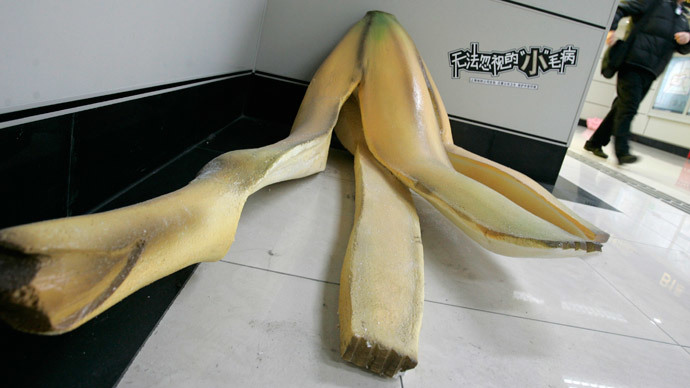The world’s scientific community now knows exactly how slippery a banana peel is – and has showed its gratefulness to the Japanese physicists who measured it with a prestigious, if tongue-in-cheek, prize.
The annual Ig Nobel Prizes, awarded by the Annals of Improbable Research to authors producing eyebrow rising and laughter-enticing works of science, are a counterpart to the famous Nobel Prizes. This year they went to 10 teams of researchers of physics, biology, art and economics, among others.
For instance a Japanese group took the award in physics for measuring exactly how slippery a banana peel is. Chinese neuroscientists studied what happens in the brain of a person seeing a face in a piece of toast – a work they reported in a paper called ‘Seeing Jesus in Toast’.
Other teams found out that people who like to stay up late tend to be narcissistic manipulators and that dogs prefer to poop while aligning themselves to Earth’s magnetic field. Then there was how strips of cured pork can stop nosebleeds, and how reindeer react to humans wearing polar bear costumes. There was also a study of pain caused by bad art and another about how revenues from smuggling and drug sales add to Italy’s national economy.
"Every winner has done something that first makes people laugh, and then makes them think," said Marc Abrahams, the Annals’ editor and impresario for the event.
He added that his personal favorite was the reindeer paper.
"I’ve never in my life met anyone who disguised himself as a polar bear to frighten a reindeer," he said
The 24th set of Ig Nobel prizes was handed out by former winners of Nobel Prizes at a ceremony at Harvard University in Cambridge, Massachusetts, on Thursday.
In previous years, Ig Nobel prizes were awarded to research covering levitating frogs, carrying coffee in a mug and cutting onions to make people cry. Occasionally the organizers get political, as they did last year when they awarded Belarusian President Aleksandr Lukashenko for outlawing public applause as a form of protest, along with the country’s police, which arrested a one-armed man for breaking this law.


